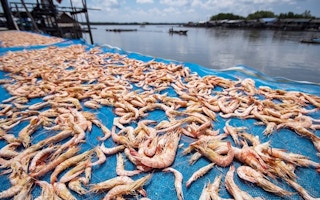Advances in aquaculture have enabled an estimated 13 per cent annual increase in global shrimp production since the 1980s but at the same time, the price of shrimp has dropped nearly 30 per cent, transforming this once rare luxury into one of the most popular and affordable seafood products in the world.
To continue reading, subscribe to Eco‑Business.
There's something for everyone. We offer a range of subscription plans.
- Access our stories and receive our Insights Weekly newsletter with the free EB Member plan.
- Unlock unlimited access to our content and archive with EB Circle.
- Publish your content with EB Premium.
For developing countries in Asia, this lucrative industry plays an important role in economic development by creating millions of jobs and income generating opportunities. However, shrimp production has also been associated with severe environmental degradation, excessive use of antibiotics and chemicals, low wages, and, more recently, scandals around modern day slavery and human trafficking.
This new report on the shrimp industry in Asia looks at responsible and inclusive business opportunities for the whole value chain. It highlights responsible and inclusive business interventions that can increase opportunities for those people involved in fishing for or farming shrimp, who are often poorly compensated for their work. It looks at how retailers and distributors can make their supply chains more productive, safe and secure, whilst at the same time increasing incomes for poor communities.
“
Whilst the complexity and limited transparency of the shrimp value chain may make it difficult for companies to take action, it is clear that ‘business as usual’ is neither sustainable nor consistent with increasing the incomes of poor people involved in shrimp fishing, farming and processing
The report seeks to present an introduction to the key challenges facing the shrimp industry and practices in three of the world’s main producing countries, Thailand, Vietnam and Indonesia. It focuses on small scale fishers, farmers and processors and identifies possible entry points and interventions for inclusive business opportunities. It is based on a range of different research studies as well as in-depth interviews conducted with fishers, farmers and processors in the south of Thailand.
The shrimp industry is under increasing scrutiny from international non-governmental organisations and advocacy groups that are eager to expose malpractices, and connect abuses in local supply chains to multinational corporations. Whilst the complexity and limited transparency of the shrimp value chain may make it difficult for companies to take action, it is clear that ‘business as usual’ is neither sustainable nor consistent with increasing the incomes of poor people involved in shrimp fishing, farming and processing. Given that production and processing is dominated by small enterprises where revenues are low (and in some cases falling), the report looks at opportunities to develop much more inclusive value chains that can better involve the poor and increase benefits accruing to them.
The report argues that businesses, consumers, NGOs, development organisations and local governments can work together to find solutions to problems through and examination of new opportunities for inclusive business. There is a great opportunity to turn recent scandals in the industry into opportunities for new ways of doing business in Asia that creates shared value for both large retailers and small producers. Asian businesses can take a lead in making shrimp more sustainable, avoiding some of the human rights violations that have been the subject of recent reports.
Ten key challenges facing the industry are discussed in the report. These include:
- Overfishing
- Fishing practices
- Mangrove destruction
- Pollution
- Ecosystem disruption from non-native species
- Disease
- Consumer health and safety
- Human rights abuses
- Child labour, and
- Land grabs
The report highlights the risks to businesses that are operating in the shrimp value chain. These include reputational risks, the sustainability of the supply chain, food security, price and quality volatility, worker protests and violation of labour laws. But it also present a number of opportunities for developing more inclusive business models in the industry, which can be good for all parts of the value chain. In particular, possible entry points for inclusive business interventions are highlighted.
The paper, written by CSR Asia, is part of a partnership with Oxfam on inclusive business value chains.










